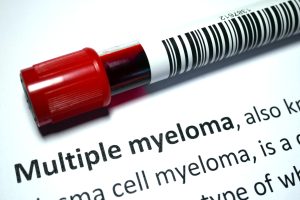
24 RCCA Physicians Named to 2025 Castle Connolly ‘Top Doctors’ List for Exceptional Cancer Care
A cancer diagnosis can be frightening. An individual may worry about how, or if, they will get better. The future becomes unclear and the strain
HIPAA Alert: Potential Data Breach Learn More
Questions on Oncology, Hematology and/or Infusion Clinical Services due to COVID-19 Crisis – CALL 833-698-1623
Important Information for Our Patients Regarding the Coronavirus.
RCCA Providing Area Cancer Patients with Access to Care During Coronavirus Outbreak
RCCA Offering Patients Virtual Visits During Coronavirus Pandemic
Colon cancer can affect anyone regardless of race, gender, or other characteristics. While colon cancer occurs slightly more frequently in men, women are nearly as susceptible and should know the warning signs of the disease. According to the American Cancer Society, the lifetime risk for developing colon cancer is one in 23 for men and one in 25 for women.
The medical oncologists of Regional Cancer Care Associates (RCCA), one of the nation’s largest networks of cancer specialists, have considerable experience and expertise in treating colon cancer. Let’s take a deeper dive into colon cancer, its causes, the warning signs of colon cancer in women, and the importance of early detection and diagnosis.

Colon cancer impacts the colon, the portion of the large intestine that breaks down waste and helps to digest foods and absorb nutrients.
Colon cancer often develops from polyps inside the colon. These polyps are usually found in the innermost colon lining, called the mucosa. Polyps are made of cells that excrete mucus, among other fluids. When the cells inside these polyps become changed or mutated, cancer can develop. At that point, the mutated cells begin to rapidly multiply and grow. This is how tumors are formed.
If polyps are detected on a colonoscopy, the physician performing that screening procedure typically will remove them. Although most polyps are noncancerous, they can slowly become cancerous over time. Without treatment, cancer arising from polyps can spread first to other areas of the colon and eventually invade nearby structures, such as the lymph nodes and blood vessels. This is why early detection and colon cancer treatment are so important.
Several factors have been found to increase the risk of developing colon cancer. These risk factors for colon cancer include:
While colon cancer most often affects individuals who are 50 years of age and older, the number of younger adults being diagnosed with colorectal cancer is increasing. Similarly, while men are somewhat more susceptible to the disease, it can also affect women. That makes it important for women to know the early signs of colon cancer.
The signs of colon cancer are the same for both in men and women. These symptoms can include:
While the signs and symptoms of colon cancer are the same for men and women, women can experience some sex-specific conditions, such as menstrual-related cramping or a sensation of bloating sometimes associated with oral contraceptive use, that mimic the symptoms of colon cancer.
Further, it is important to note that the great majority of women and men who experience one or more of the symptoms listed above will not have colon cancer. Nonetheless, it is important to consult a physician about these symptoms, particularly if they are pronounced, arose suddenly, or have persisted for an extended period.
Regular colon cancer screenings are designed to detect pre-cancerous polyps and early-stage, asymptomatic cancer. The most common procedure for colon cancer screening is a colonoscopy, which typically is performed by a gastroenterologist, colorectal surgeon, or other physician with specialized training in diseases of the gastrointestinal tract. During the procedure, the physician inserts a thin probe called a colonoscope into the colon via the anus. Patients having a colonoscopy typically receive conscious sedation medication or light anesthesia to prevent discomfort.
The colonoscope is made with flexible tubing, allowing easy and convenient insertion and mobility. It also is equipped with a small video camera and a light to provide the physician with a clear view of the colon. This enables the physician to carefully inspect the colon lining and tissues to check for signs of colon cancer, such as polyps or irritated and swollen tissues.
If polyps are found, they may be removed during the colonoscopy. A polyp sample is then sent to a laboratory to determine if it is benign (non-cancerous) or malignant (cancerous).
Other measures for preventative colon cancer testing include:
While these less-invasive screening methods can rule out colon cancer for many people at normal risk of the disease, a colonoscopy may still be necessary if noninvasive test results suggest a problem.
Once colon cancer is diagnosed, a medical oncologist will work with the patient to develop and implement a personalized treatment plan. Identifying the optimal treatment strategy for a specific patient involves evaluating the patient’s condition, stage of colon cancer, family medical history, type of colon cancer, and other factors.
Scheduling regular screening appointments for colon cancer is essential for detecting the early signs of colon cancer and for reducing the risk of developing the disease.
Both the American Cancer Society and U.S. Preventive Services Task Force recommend that everyone at normal risk for colon cancer receive regular colonoscopy screenings for colon cancer every 10 years, starting at age 45. Both organizations, however, recommend earlier and more frequent screenings for persons with a family history of polyps or cancer, or who have an inflammatory bowel condition.
Delayed diagnosis and treatment of colon cancer can have detrimental consequences. A person with polyps who puts off screening can be at risk of the polyp turning cancerous. While some polyps take years to mutate, others can change quickly.
Additionally, as cancer goes untreated, cancerous cells can grow and multiply. Cancer can spread throughout the colon and into nearby structures, such as blood vessels and lymph nodes. In contrast, as noted above, non-cancerous polyps are promptly removed during routine colonoscopies – before they can become cancerous.
Patients can rely on the expert medical oncologists of Regional Cancer Care Associates to provide the latest therapies for colon cancer and comprehensive, compassionate care. RCCA oncologists and hematologists see more than 26,000 new patients each year and provide care to more than 245,000 established patients, collaborating closely with their patients’ other physicians.
RCCA has 22 conveniently located community-based centers throughout New Jersey, Connecticut, Maryland, and the Washington, DC area, so you can find excellent colon cancer treatment close to home.
If you’ve been diagnosed with colon cancer or need a second opinion, schedule an appointment or contact us today.
For more information or to schedule an appointment,
call 844-346-7222. You can also schedule an appointment by calling the RCCA location nearest you.

A cancer diagnosis can be frightening. An individual may worry about how, or if, they will get better. The future becomes unclear and the strain

Multiple myeloma (MM) is a rare type of blood cancer that often develops without early symptoms, making awareness of risk factors essential. Regional Cancer Care

A cancer diagnosis can bring a wide range of emotions, from fear and stress to sadness and hope. These feelings are a natural part of

Regional Cancer Care Associates is one of fewer than 200 medical practices in the country selected to participate in the Oncology Care Model (OCM); a recent Medicare initiative aimed at improving care coordination and access to and quality of care for Medicare beneficiaries undergoing chemotherapy treatment.